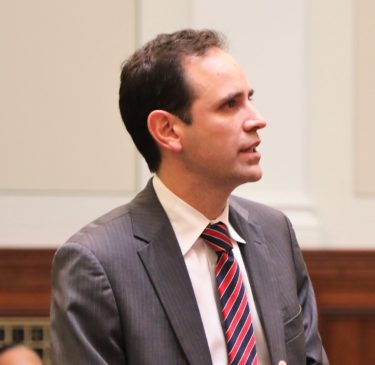NCJW Supports Judge Gabriel P. Sanchez. Here’s why:
Judge Gabriel P. Sanchez has spent a majority of his career working in California state government primarily in legal affairs, civil rights, and criminal justice reform. Since 2018, he has served as an Associate Justice on the California Court of Appeal, First Appellate District — the first male Latino judge ever to serve on the First District Court of Appeal. Before his tenure in state government, Judge Sanchez worked in private practice where he litigated a wide range of matters at the trial and appellate levels in addition to an active pro bono practice. He received his JD from Yale Law School,a Master in Philosophy from the University of Cambridge,and a BA, cum laude, from Yale College. Judge Sanchez was a Fulbright Scholar in Buenos Aires, Argentina.
Judge Gabriel P. Sanchez’s stance on important issues:
Criminal Justice Reform:
As Legal Affairs Secretary and Senior Advisor on corrections and criminal justice matters to California Governor Edmund G. Brown, Jr., Judge Sanchez was responsible for managing and directing all state and federal prisoner class action cases and other significant corrections litigation and appeals, supervising the work of several hundred attorneys from the Office of the Attorney General and outside counsel. Judge Sanchez also advised the Governor and other senior staff on criminal justice reform legislation, executive appointments, parole and clemency decisions, and regulatory changes. He played an instrumental role in the drafting and implementation of the landmark Public Safety and Rehabilitation Act of 2016 (Proposition 57) and its enabling regulations. Prior to joining the Governor’s office, Judge Sanchez served as a deputy in the Correctional Law Section of the Office of the Attorney General in San Francisco, where he was a lead attorney on several complex prisoner class action cases, including Coleman v. Brown, Plata v. Brown and Three Judge Court.
Worker’s Rights:
In Bautista v. State of California, Judge Sanchez — working as a pro bono attorney — helped improve heat illness safety protections for California farmworkers and ensure the protections were enforced across the state.
Judge Gabriel P. Sanchez’s experience and education:
Experience and Clerkships:
Judge Sanchez has served as an Associate Justice on the California Court of Appeal, First Appellate District since 2018. Prior to being appointed to the bench, Judge Sanchez worked for seven years in California state government as Deputy Legal Affairs Secretary to Governor Edmund Brown and Deputy Attorney General in the Correctional Law Section of the California Attorney General’s Office. Before his tenure in state government, Judge Sanchez was an associate at Munger, Tolles & Olson LLP where he litigated a wide range of civil matters at the trial and appellate levels. Judge Sanchez served as a law clerk for Judge Richard A. Paez on the US Court of Appeals for the Ninth Circuit from 2005 to 2006.
Education and Recognitions:
Judge Sanchez received his BA from Yale College, a Master in Philosophy degree in European Studies from the University of Cambridge, and a JD from Yale Law School. He was also a Fulbright Scholar in Buenos Aires, Argentina, where he studied and wrote about presidential electoral campaign policies. Judge Sanchez received the ACLU of Southern California’s Social Justice Award for his work on Bautista v. State of California.
Professional Affiliations:
Judge Sanchez is an active member of the Pacific Council on International policy, a non-profit membership organization committed to working on international affairs.
